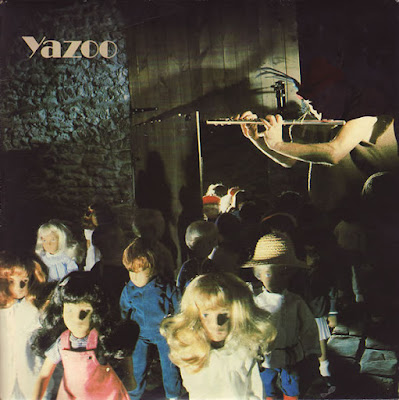One week at number one on w/e 18th May 1985
James were a somewhat pious bunch of buggers to begin with. While preparing myself for this blog entry, I made the mistake of listening to “Hymn From A Village” immediately before bedtime, trying to get my head around Tim Booth in particular. My REM brain – no pun intended – immediately went to work on the scenario, and I was presented with an image of Paul McGann playing Booth playing Jesus Christ preaching to a large crowd in Jeruasalem. The throng were restless and somewhat ambivalent about his messages.
Then I woke up, and immediately felt that this was a disappointing result from my brain. If it was trying to help me, it could at least deliver something more than idle critical hackwork. I mean, the old “rock star as God” cliché, spare me (I was then punished with a proper nightmare about something else, but never mind about that). But then again… was it a case of "Fair comment" in this instance?
While James went on to become proper rock stars playing enormous venues, you could easily argue that they had an unusually daring mission statement here for a group of minor renown. There’s an unspoken rule in most artforms that you don’t reflect on the art itself in your work; therefore, artists should not paint works which offer commentaries on other art, and poets should not write poems about poetry. Entering into such a feedback loop suggests self-indulgence, boring your audience with your tales of what you got up to at “the office” that day and who delighted and aggravated you.
Rock music has always operated to slightly different standards, however, and there are plenty of songs out there appraising heroes, offering dedication to whole genres, or just singing about the transporting nature of music itself. Then there are the bitchy sideswipes – “There There My Dear” by Dexys Midnight Runners is probably one of the most successful examples – which want to throw darts at photos of the lazy, underachieving villains in the business.
“Hymn From The Village” is definitely on the latter side of the fence, kicking and screaming at rock lyricists who have no interest in engaging with anything beyond mundane cliches. There’s not even any build-up. Booth begins cuttingly and unequivocally: “This song's made up, made second rate/ Cosmetic music, powderpuff/ Pop tunes, false rhymes, all lightweight bluffs/ Secondhand ideas, no soul, no hate…” If that weren’t enough, he really starts waving his sword around later, as eloquent as a warrior in an ancient play: “This language used is all worn out/ A walking corpse it won't play dead/ Disease dragged on from bed to bed/ Paid for your twist, paid for shout”.
The song itself is all campfire bone and steel rattles, where deep, rubbery basslines mix with exotic jangles. It builds steadily, getting more frantic and agitated as it goes along, in love with its own noise but also rattled by the hatred of everyone else’s. There’s not a second of this single where I think they don’t mean it – the passion is there, the intent clear to everyone – but in the 1985 world, there were surely bigger things to worry about than the lyrical complacency of pop artists? A world of Morrissey, Elvis Costello, Mark E Smith, Billy Bragg, Cathal Coughlan, and umpteen anarcho-punk bands wasn’t exactly a scene left bone-dry of lyrical passion, or even literate and thoughtful musicians. Is it possible that Tim Booth wasn’t actually telling us about what we didn’t currently have, but grandstanding about who he believed he was? If so, he wouldn’t be the last Manc Son of God to climb up the summit to do so.
It’s a deeply odd single whose climax of “Heard you calling through the drumbeat/ Can you hear the question, feel the reply?” could just as easily belong to an ecstatic piece of early 90s House music, were it not so frenzied, angry and manic. It’s asking for something much bigger from musicians – a relationship, a sense of belonging, a campfire to place a population around who would no longer feel so apart and alone; intelligent observations and answers, not vague outlines.


